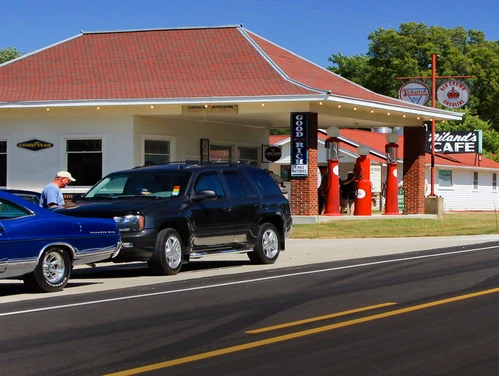On this page...
The efficiency and safety of a highway depend largely on the amount and character of interruptions to the movement of traffic. The primary cause of these interruptions is vehicular movements to and from business, residences and other developments along the highway. Regulation and overall control of highway access are necessary to provide efficient and safe highway operation and to utilize the full potential of the highway investment. Accordingly, the Iowa DOT has established an access management code to control access to the Primary Highway System.
Back to topWhat is Access Management?
A means to maintain the safe and efficient movement of traffic by controlling:
- The design of accesses
- The location of accesses
- The number of access allowed
Access is means of ingress or egress between a primary highway and abutting property or an intersecting local public road or street. In lay terms, access is also defined as entrances or driveways from properties to a public road system.
Back to topWhy is Access Management Needed?
The primary road systems serve two necessary but often conflicting functions:
- Maintain the operational capacity, efficiency and functional purpose of the primary highway.
- Manage how the public accesses land uses that are adjacent to a primary highway
What are the Goals of Access Management?
Create a safer environment for the entire transportation network by:
- Limiting the number of conflicts (accesses)
- Separating potential conflict points
- Removing or minimizing turning vehicles and queues from through traffic movements
What Benefits Are Received From Access Management Procedures?
The most important benefit of access management is providing a safer roadway and decreasing the number of severe crashes and congestion.
The traveling public receives operational benefits when conflicts points are minimized or separated, highway capacity is increased, delays are reduced and the free flow of traffic is expedited and the public investment made in the highway system is preserved.
Environmental benefits are also gained because vehicle emissions are reduced and fuel economy is increased.
Back to topHow Does the Department Control Access?
As provided in Iowa Code (306A) and Iowa Administrative Code (761/Chapter 112), the Iowa Department of Transportation was granted authority to manage access on "controlled access highways", which establishes that the "Department is authorized to design any controlled-access road and regulate, restrict, or prohibit access as best to serve the traffic for which such facility is intended," IC306A(4).
Back to topContact
Engineering Operations Technicians
In Iowa, the permitting process is administered by the Iowa DOT's district offices. Iowa is divided into six districts as shown below. Each district has designated staff, known as engineering operations technicians or EOT’s, to assist applicants and review the requests for entrance permits. Use the map below to find your district contact. The permit application must be approved before work may begin. The approval process may include internal Iowa DOT review by different offices. Additionally, there may be requests for more information from the applicant.
The Department requires a traffic impact analysis for all Type "A" and Type "B" access permits. Guidelines for a traffic impact analysis can be located in the resources below.
Back to top